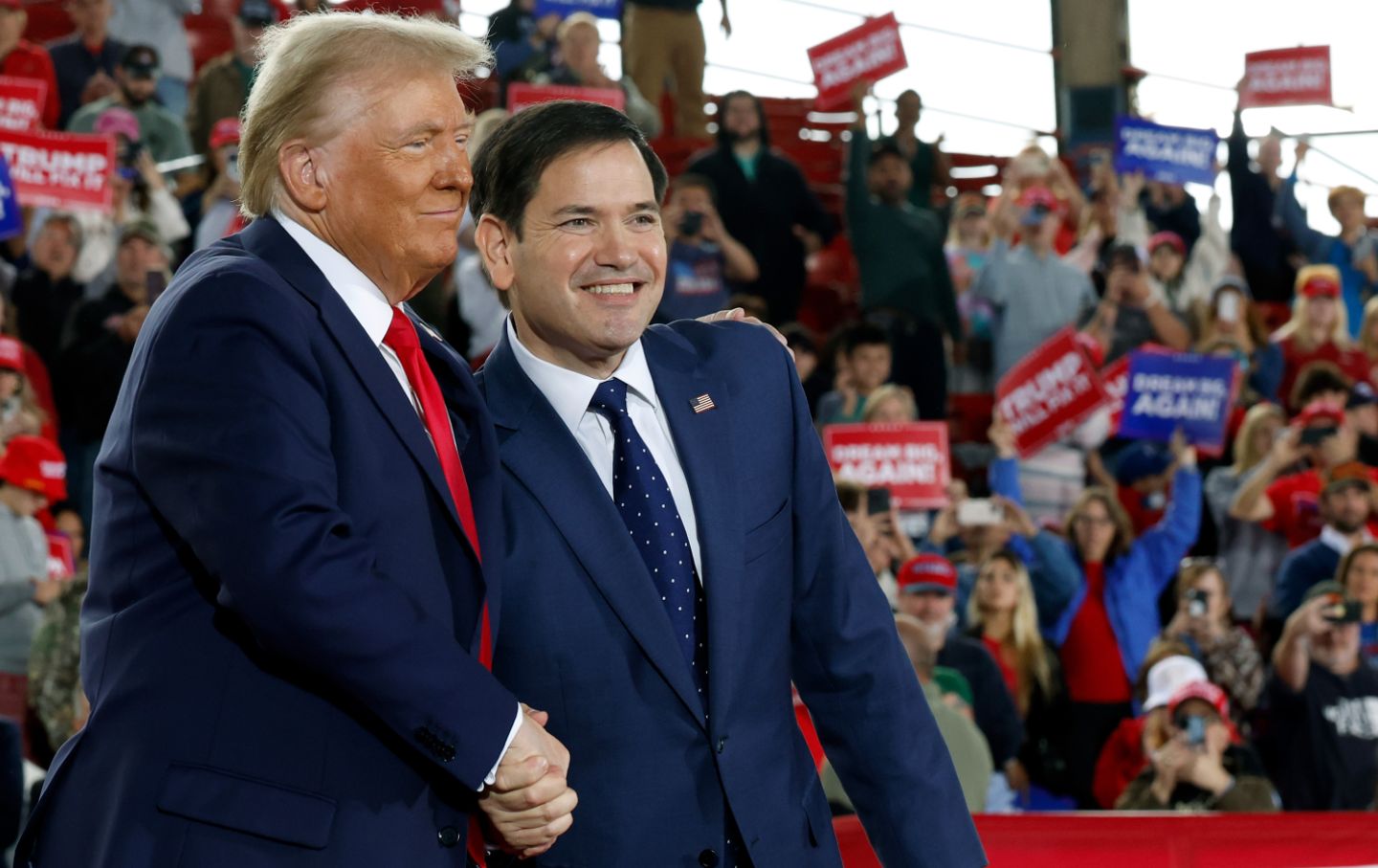Biden’s Cold War Nostalgia Is Dooming His Presidency
Missile scares and military Keynesianism won’t win voters who want domestic reform.

Joe Biden easily lapses into effusive reveries about the past, especially during sentimental public occasions. When Biden retired from the Senate in 2009 to assume the office of vice president, he gave an emotional speech recalling that when he was first sworn into that august body in 1973, “giants loomed over the landscape of the United States Senate.” These supposed giants, including avowed racists like James Eastland and Storm Thurmond, remain imposing landmarks in Biden’s mental world, the orienting pillars who guide his sense of what politics can achieve. In his valedictory oration, Biden singled out not just Eastland and Thurmond but also the late Henry “Scoop” Jackson, a name half-remembered in American politics, but a key influence on Biden’s political evolution.
Biden’s relationship with Jackson was complicated. When Biden was first elected in 1972, he rode into office as part of a new wave of Democrats who were adamantly opposed to the Vietnam War. Scoop Jackson, a long-serving senator from Washington State, was a die-hard Cold War liberal, not only committed to the Vietnam adventure but also eager to attack the foreign policy of Richard Nixon for being too soft on communism. Jackson represented a politics that combined support for robust social spending and labor unions with equal fervor in bestowing largesse on the Pentagon. Jackson’s senatorial staff was a hotbed of hawkish Democrats who were on the cusp of becoming neoconservatives, including Elliot Abrams, Paul Wolfowitz, and Doug Feith. These Jackson protégés would go on to join Republican administrations and be major players who oversaw some of the most shameful and disastrous foreign policy decisions in modern history: the support of death squads in Latin American in the 1980s, the Iran-Contra scandal, and the 2003 invasion of Iraq.
Through the course of the 1970s and early 1980s, as disillusionment with the Vietnam War gave way to the revival of Cold War passions in the last years of Jimmy Carter’s presidency and the triumph of Ronald Reagan, Biden drew closer to Jackson politically, taking instruction from this unreconstructed advocate for militarism. In his 1983 eulogy for Jackson, again delivered on the Senate floor, Biden singled out in particular Jackson’s militant pro-Israel position, which Biden came to adopt as his own. According to Biden, on the matter of Israel, “Scoop Jackson changed a major part of my political life.”
Yet Biden knows better than anyone that Scoop Jackson’s belligerent foreign policy, including the commitment to giving Israel a virtual blank check of American support, has been losing ground in the Democratic Party for decades. According to Benjamin Netanyahu, in 2021 Biden emphasized to him in a private conversation that domestic pressures were making it difficult for Biden to be as pro-Israel as he wanted. Biden reportedly said, “Bibi, I gotta tell you, I’m coming under a lot of pressure back here. This is not Scoop Jackson’s Democratic Party.”
The paradox of the Biden presidency is that he and his foreign policy team (notably Secretary of State Antony Blinken, national security adviser Jake Sullivan, and White House aide Brett McGurk) are the last Scoop Jackson Democrats, a crew of neoconservatives and liberal hawks who are pursuing a wildly anachronistic policy. This was evident long before October 7, when the Hamas massacre and Biden’s ensuing support for Israel’s devastation of Gaza brought the problem into stark relief. The killing fields of Gaza are only making visible the horrific and ongoing human costs of Biden’s long-standing commitment to an obsolete Cold War liberalism that is completely inadequate to the challenges of the 21st century.
Like Scoop Jackson, Joe Biden is an over-eager and uncritical enthusiast for military Keynesianism—the use of arms spending to fuel economic growth. The ideal of Cold War liberalism was to fuse foreign and domestic policy, creating an integrated warfare/welfare state. Jackson, who became known as “the senator from Boeing” for his ardent support for the airplane manufacturer—a major employer in Washington State—was the leading exponent of the idea that lavish government funding of armament production was the best path for creating a large unionized workforce force and a robust domestic manufacturing sector.
The logic here is not so much “guns and butter” but that if you manufacture enough guns, you will create enough high-paying jobs that will allow Americans to buy butter. Underlying this project is the brute political reality that it is easier to get bipartisan consensus and elite comity (which Biden, still a man of the Senate in his worldview, always seeks) if you push for defense spending rather than social spending. Further, it is much easier to get funding for social spending (as in the buildup of universities after the Russians launched Sputnik in 1957) if you can make the case that national security depends on it.
Victoria Nuland, under secretary of state for political affairs and a major force in setting East European policy, defended spending more on Ukraine in classic military Keynesian terms, telling CNN on February 24, “We will do what we have always done, which is defend democracy and freedom around the world … And by the way, we have to remember that the bulk of this money is going right back into the U.S., to make those weapons.” Scoop Jackson would have understood the point perfectly.
In the circular logic of military Keynesianism, spending money on wars abroad juices the economy at home, while spending money on domestic infrastructure makes the nation stronger in preparation for future wars. Writing in Sidecar, the blog of the New Left Review, the historian Grey Anderson acutely pointed out that the Biden administration’s large-scale spending on infrastructure and climate change are being done under the auspices of national security. As Anderson notes, “For its conceptors, the logic governing the new era of infrastructure spending is fundamentally geopolitical; its precedent is to be sought not in the New Deal but in the military Keynesianism of the Cold War, seen by the ‘Wise Men’ who waged it as a condition for victory in America’s struggle against the Soviet Union”
In 2019, Jake Sullivan cowrote an article fantasizing about a new “Sputnik moment” that would scare the United States enough to unleash a new wave of spending on scientific research and infrastructure. Throughout the Biden administration, there have repeated attempts to conjure such a “Sputnik moment” into being, a task made difficult by the lack of any genuine threat along that line. In early 2023, the American foreign policy elite was sent into a ridiculous paroxysm over a so-called “balloon gap” when an errant Chinese weather balloon entered American airspace. The earlier and equally absurd fear of a Russian or Chinese super-weapon blamed for the so-called “Havana Syndrome” followed the same pattern of paranoid and reality-detached fearmongering.
In the last few weeks, yet another fantasy of a new Sputnik moment has emerged in hysterical press reports that the Russian government is developing a new generation of devastating space weapons. CNN claims “Russia is trying to develop a nuclear space weapon that would destroy satellites by creating a massive energy wave when detonated, potentially crippling a vast swath of the commercial and government satellites that the world below depends on to talk on cell phones, pay bills, and surf the internet, according to three sources familiar with US intelligence about the weapon.”
The New York Times has repeatedly echoed these unverified allegations of Russian killer energy waves. When examined closely, all of these stories turn out to be remarkably flimsy, sourced from anonymous intelligence officials and filled with caveats buried deep in each article that make clear there is no consensus of experts to support the claims. A Times article published on February 14 noted, “The intelligence was developed in recent days, and while it is important, officials said it was not a break-the-glass kind of warning of any imminent threat.” Another Times article, published a week later, noted, “The American intelligence agencies are sharply divided in their opinion about what President Vladimir V. Putin is planning.” Further, these warnings of a nebulous threat only rarely acknowledge that the United States military has long pursued the weaponization of space, an agenda that will be immensely bolstered by the current wave of hysterical reporting.
Barring actual new evidence, the current Russian space weapons scare resembles the notorious panic of the late 1950s and early 1960s when delirium over a supposed “missile gap” gripped Washington, promoted by Cold War liberals like John F. Kennedy and Scoop Jackson.
As in the Cold War, the program of military Keynesianism ramped up by agitated propaganda is not a recipe for prosperity and security. Rather, it’s likely to lead to more wars and domestic strife—especially since there are large sectors of the public who oppose an interventionist foreign policy, as seen both among Republican voters who dislike spending on Ukraine and in the large and growing number of Democrats upset over Biden’s virtual blank check to Israel. Simply put, Biden’s dream of restoring a Cold War–style bipartisan elite–controlled consensus for American hegemony backed by military Keynesianism is almost impossible given the realities of fragmented public opinion. A Politico report analyzing Biden’s attempt to sell himself as a foreign policy president offered this telling caution: “Until recently, it’s been clear that Americans are yearning to turn inward and focus on their own problems.” The only correction to offer is that what was true “until recently” remains true.
Popular
“swipe left below to view more authors”Swipe →Unfortunately, Biden’s pursuit of this illusory agenda is leading to a disaster-prone foreign policy, where an aversion to diplomacy combines with a commitment to increases in arms spending and assertions of hegemony. Writing in Compact, the journalist John Judis made a compelling case that “the Biden administration has seriously blundered in its relations with Iran, Ukraine and Russia, Israel, and Afghanistan.” In all these examples, Biden has hubristically disregarded dissenting voices or evidence that his administration’s underlying assumptions are false. Afghanistan is a slight anomaly, because Biden’s overall goal of withdrawal was more than justified. Unfortunately, by relying on faulty intelligence that over-estimated the strength of the American-supported puppet government, Biden oversaw a messy retreat that tarnished his reputation.
The only thing one needs to add to Judis’s cogent indictment is that Biden’s blunders have a clear ideological source: Biden is trying to reinvent Cold War liberalism and be the modern Scoop Jackson, decades after most Democrats turned away from Jackson’s dangerous militarism.
More from
Jeet Heer 

No, Kamala Harris Staffers Did Not Run a “Flawless” Campaign No, Kamala Harris Staffers Did Not Run a “Flawless” Campaign
Democratic strategists are still patting themselves on the back for a catastrophic defeat.

Donald Trump’s Government of Gangsters Donald Trump’s Government of Gangsters
Who is being naïve now?

The Democrats Will Keep Losing Until They Solve Their Plutocracy Problem The Democrats Will Keep Losing Until They Solve Their Plutocracy Problem
The party’s habitual deference to big donors makes it impossible to effectively oppose Trumpism.

Only a Working-Class Party Can Challenge Donald Trump’s Corruption Only a Working-Class Party Can Challenge Donald Trump’s Corruption
GOP plutocracy thrives as long as Democrats remain beholden to Wall Street.

Biden’s Mindless Escalation Is a Final Betrayal of Ukraine Biden’s Mindless Escalation Is a Final Betrayal of Ukraine
Instead of preparing for inevitable negotiations, the outgoing president adds fuel to the fire.

Donald Trump’s Foreign Policy Will Be Chaos First, Not America First Donald Trump’s Foreign Policy Will Be Chaos First, Not America First
His team of cronies includes establishment hawks and cranky outsiders who are more likely to deliver global anarchy than world peace.


